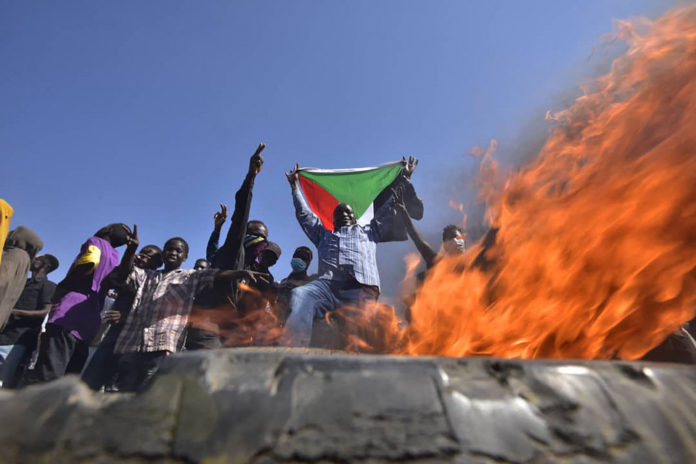KHARTOUM: Sudanese security forces killed at least five demonstrators Saturday in a crackdown on anti-coup protests, medics said, after the military tightened its grip by forming a new ruling council.
The pro-democracy protests come nearly three weeks after top general Abdel Fattah al-Burhan ousted the government, detained the civilian leadership and declared a state of emergency.
The independent Central Committee for Sudanese doctors said five protesters were killed in Saturday’s rallies, two in Khartoum’s twin city of Omdurman and three in east Khartoum.
Four were shot dead, while one died from “suffocation by tear gas”, the medics said.
A “large number of people” were also wounded by live rounds “of the putschist military council”, they said.
Security forces stormed one hospital in Omdurman and “detained several of the people wounded” there, they added.
The latest deaths brings to 20 the number of people killed in anti-coup protests since the military takeover on October 25, according to the medics.
Gunshots were heard and tear gas fired as security forces tried to break the protests, witnesses and AFP correspondents said.
“No, no to military rule”, “Civilian (rule) is the people’s choice”, protesters shouted.
The US embassy in Khartoum the use of force by security forces, saying in a statement it “deeply regrets the loss of life and injuries of dozens of Sudanese citizens demonstrating today for freedom and democracy.”
Protests in Sudan and beyond
Tens of thousands rallied nationwide, with protests taking place in several cities, including Port Sudan and in the Darfur region, witnesses said.
“The military should not have anything to do with politics, they should safeguard the constitution which Burhan himself has turned against,” said protester Ahmed Abdelrahman in Khartoum.
Any hopes the demonstrators had that the military would back down were dashed on Thursday, when Burhan named himself head of a new ruling Sovereign Council that excludes the country’s main civilian bloc.
The move sparked international condemnation and on Saturday demonstrators shouted: “Down with the entire council”.
The protests occurred despite the heavy presence of military, police and paramilitary forces in Khartoum, where bridges connecting the capital to neighbouring cities were sealed off.
The security forces also blocked roads leading to army headquarters, the site of a 2019 mass sit-in that prompted the generals to oust longtime president Omar al-Bashir.
Information Minister Hamza Baloul, who was briefly detained in the military takeover, took part in Saturday’s protests in Khartoum.
“The Sudanese people have decided to create a civilian nation and there is no will stronger than that of the Sudanese people’s,” he said in a video posted online, urging people to press on with “peaceful demonstrations until the fall” of the coup leaders.
Demonstrations were also organised elsewhere around the world.
In Paris, around 400 people in a central square denounced the coup and called for the “immediate handover of power to civilians”, an AFP reporter reported.
In Berlin, about 100 protesters at Brandenburg Gate carried a banner that read: “A victory for the Sudanese protesters… is a victory for all of us!”
Call for restraint
Saturday’s demonstrations were largely organised by informal groups known as “resistance committees”, which emerged during the 2019 protests against Bashir.
They have called for multiple protests since the coup and mobilised crowds via text messages as Sudan has faced an internet outage with phone lines intermittently disrupted.
On Friday, military figures and new civilian members of a new ruling council were sworn in before Burhan.
Three former rebel leaders who were members of the ousted Sovereign Council and were appointed to the new one did not attend the ceremony. They had previously rejected the military coup.
The newly named council features several new and little-known figures to represent civilians.
But it excludes any members of the Forces for Freedom and Change (FFC), an umbrella alliance which spearheaded the anti-Bashir protests, and the main bloc calling for a transition to civilian rule.
The UN has criticised the military’s latest “unilateral” step, while Western countries said it “complicates efforts to put Sudan’s democratic transition back on track”.
Burhan insists the military’s move on October 25 “was not a coup” but a push to “rectify the course of the transition”.
